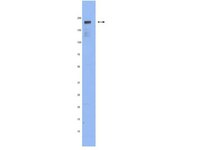The tumour-suppressor Scribble dictates cell polarity during directed epithelial migration: regulation of Rho GTPase recruitment to the leading edge.
Dow, L E, et al.
Oncogene, 26: 2272-82 (2007)
2007
显示摘要
Altered expression of human Scribble is associated with invasive epithelial cancers, however, its role in tumour development remains unclear. Mutations in Drosophila Scribble result in loss of polarity, overproliferation and 3D-tumourous overgrowth of epithelial cells. Using complementation studies in Drosophila we recently demonstrated that expression of human Scribble can also regulate polarity and restrict tissue overgrowth. Here, we have undertaken a detailed study of human Scribble function in the polarized mammary cell line, MCF10A. We show that although Scribble does not seem to be required for apical-basal polarity or proliferation control in MCF10A cells, Scribble is essential for the control of polarity associated with directed epithelial cell migration. Scribble-depleted MCF10A cells show defective in vitro wound closure and chemotactic movement. The cells at the wound edge fail to polarize, show reduced lamellipodia formation and impaired recruitment of Cdc42 and Rac1 to the leading edge. Furthermore, we show that this function is relevant in vivo as Scribble mutant mice show defective epidermal wound healing. This data identifies an essential role for mammalian Scribble in the regulation of the polarity specifically involved in directed epithelial migration. | 17043654
 |
Dlg, Scribble and Lgl in cell polarity, cell proliferation and cancer.
Humbert, Patrick, et al.
Bioessays, 25: 542-53 (2003)
2003
显示摘要
Dlg (Discs large), Scrib (Scribble) and Lgl (Lethal giant larvae) are evolutionarily conserved components of a common genetic pathway that link the seemingly disparate functions of cell polarity and cell proliferation in epithelial cells. dlg, scrib and lgl have been identified as tumour suppressor genes in Drosophila, mutations of which cause similar phenotypes, involving disruption of cell polarity and neoplastic overgrowth of tissues. The molecular mechanisms by which Dlg, Scrib and Lgl proteins regulate cell proliferation are not clear, but there is some evidence that epithelial polarisation is required for this regulation. Dlg, Scrib and Lgl are highly conserved between human and Drosophila, and we discuss evidence that these proteins also play a role in cancer progression in humans. | 12766944
 |
hScrib is a functional homologue of the Drosophila tumour suppressor Scribble.
Dow, Lukas E, et al.
Oncogene, 22: 9225-30 (2003)
2003
显示摘要
Scribble (scrib), discs large (dlg) and lethal giant larvae (lgl) encode proteins that regulate cell polarity and have been identified as neoplastic tumour suppressor genes in Drosophila melanogaster. Here, we have used the Drosophila model system to provide the first functional evidence that human Scribble (hScrib) can act as a tumour suppressor. We show that hScrib protein displays highly polarized localization in mammalian epithelial cells and colocalizes with mammalian Dlg, similar to D. melanogaster Scribble (DmScrib) distribution in Drosophila epithelium. Furthermore, hScrib can rescue the polarity and tumorous overgrowth defects of scrib mutant Drosophila. hScrib therefore can act as an effective tumour suppressor in vivo, regulating both apical-basal polarity and cellular proliferation in a manner similar to that of DmScrib in Drosophila. These data demonstrate that hScrib is a functional homologue of DmScrib and therefore predict an important role for hScrib in the suppression of mammalian tumorigenesis. | 14681682
 |











